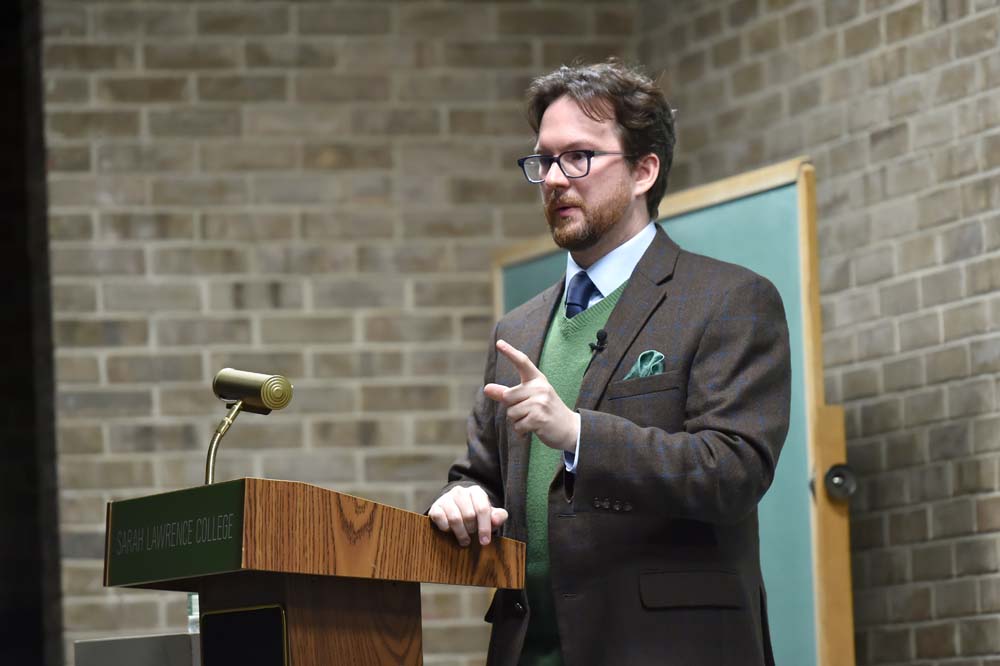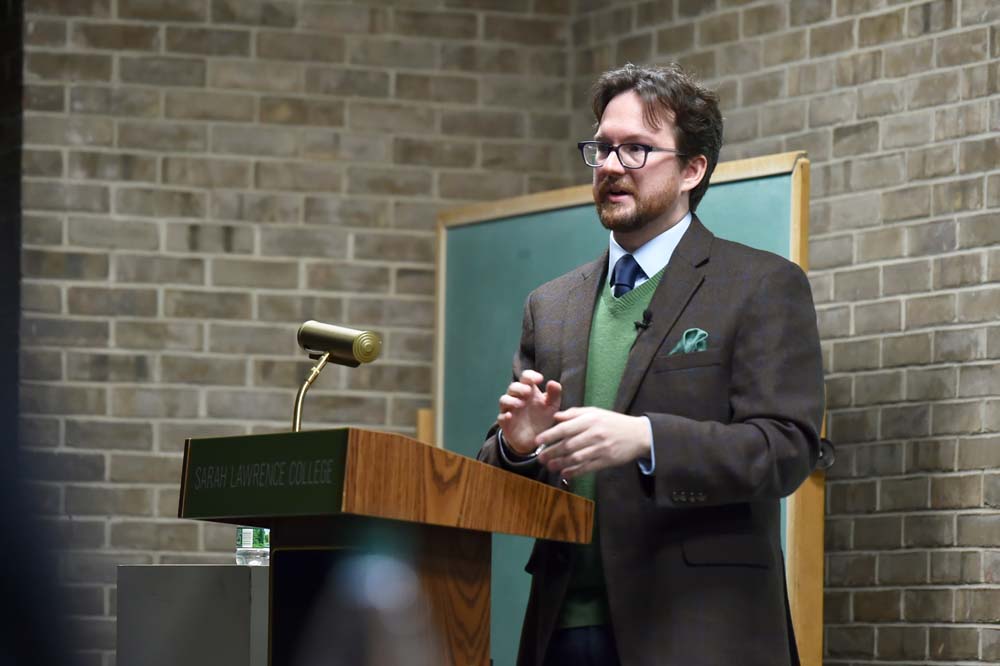February 22, 2018
When Will Gibbons, associate professor of musicology and associate dean of undergraduate studies at Texas Christian University, heard that his lecture at Sarah Lawrence would be part of the Inaugural Year Event Series exploring Democracy and Education, he had a moment of pause. Am I qualified to weigh in on this theme? After all, he is a musicologist and performing pianist—not a political scientist.
Yet the more he thought about it, the more he realized that his talk spoke in powerful and unexpected ways to Democracy and Education. Based on his forthcoming book, Unlimited Replays: Video Games and Classical Music (Oxford University Press), his talk explored the relationship between classical music and video games and the increasingly blurred lines between art and entertainment.
 “This idea of taking something that was previously reserved for elite audiences [like classical music] and making it as widely available as possible speaks to democratizing education in a way that’s really fascinating to me,” Gibbons noted.
“This idea of taking something that was previously reserved for elite audiences [like classical music] and making it as widely available as possible speaks to democratizing education in a way that’s really fascinating to me,” Gibbons noted.
In his lecture, Gibbons presented a handful of examples of two converging trends—the gamifying of classical music and the classifying of gaming music—where “cracks [have developed] in the wall between classical music and video games and where those cracks may lead to a democratization of the very concept of art.”
One such example is Clapping Music, a game that challenges users to correctly perform a piece of avant garde twentieth-century music by composer Steve Reich. Though the composition is notoriously difficult, thanks to the accessible format of the game, Gibbons pointed out, “Anyone with a bit of dedication can master this piece...so what does it mean to take classical music out of the hands of the experts?”
In terms of “classifying” game music, Gibbons cited Final Symphony, a series of concerts that features video game music performed by orchestras. In general, orchestral game music has been credited with bringing more culturally diverse patrons to concert halls and reviving sluggish bottom lines. While one would think those are positive developments, having game music encroach on more traditional music spaces has elicited fierce resistance from those who object to the mass consumption of the concert hall experience.
For Gibbons, examples such as these raise worthwhile philosophical questions, such as, “Do these old ideas about classical music and art still make sense in our current society?” and “In an era of smartphones, Spotify, and selfies, who gets to choose what counts as art and what doesn’t?”
While Gibbons envisions “a future when the artificial distinctions between highbrow and lowbrow are erased,” he conceded, “…we’re not there yet.”
Danny Jung ’20, an avid video gamer with musical interests, found Gibbons’ talk inspiring. “I never thought of video game music as even being able to be classified in more classical terms,” he said. “This was an incredibly interesting experience.”
 Gibbons concluded that while there are no easy answers to questions about art and value judgments, the act of inquiring is in and of itself beneficial: “In contemplating, art gets meaning in the first place.”
Gibbons concluded that while there are no easy answers to questions about art and value judgments, the act of inquiring is in and of itself beneficial: “In contemplating, art gets meaning in the first place.”
Will Gibbons is a musicologist focusing primarily on opera studies and music in film and interactive media. He is the author of Building the Operatic Museum: Eighteenth Century Opera in Fin-de-Siècle Paris (University of Rochester Press, 2013), co-editor of Music in Video Games: Studying Play (Routledge, 2014), and author of the forthcoming new book, Replay Value: The Art of Classical Music in Video Games (Oxford University Press).
In addition to musicological pursuits, Will performs frequently as a collaborative pianist and harpsichordist, specializing in music of the early baroque and music since 1900. Gibbons holds a BA in music (collaborative piano) from Emory & Henry College, and MA and PhD degrees in musicology from the University of North Carolina at Chapel Hill. He is the current Associate Dean of Undergraduate Studies and Associate Professor of Musicology at TCU in Fort Worth, Texas.